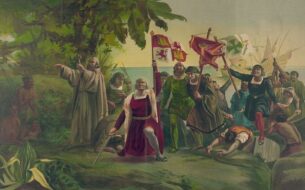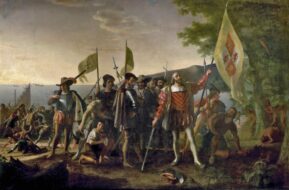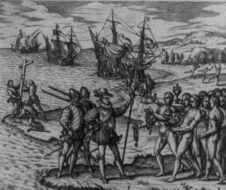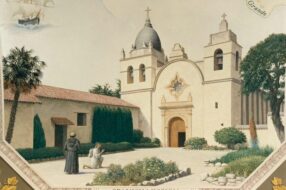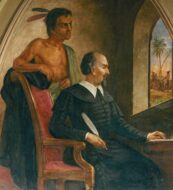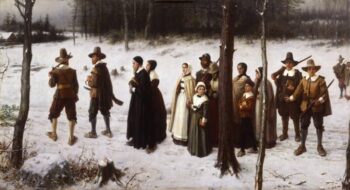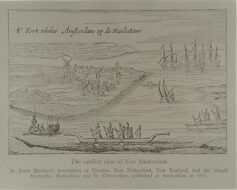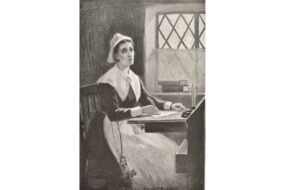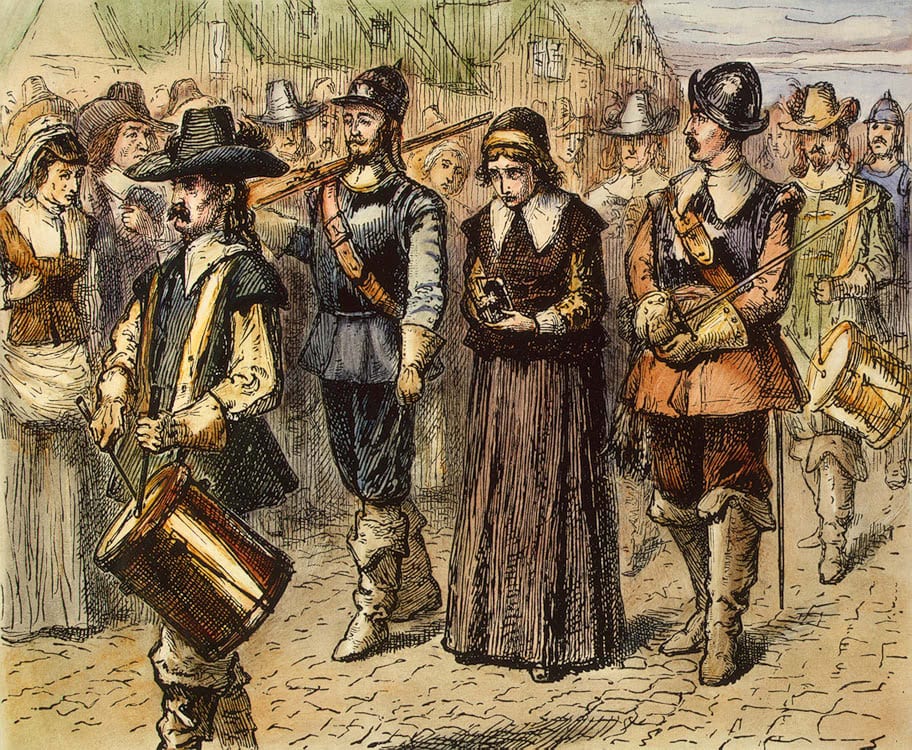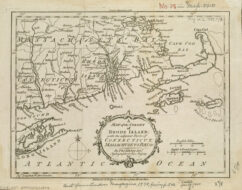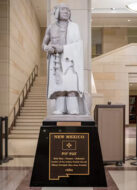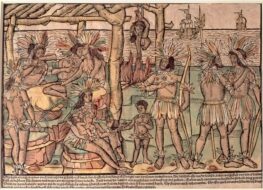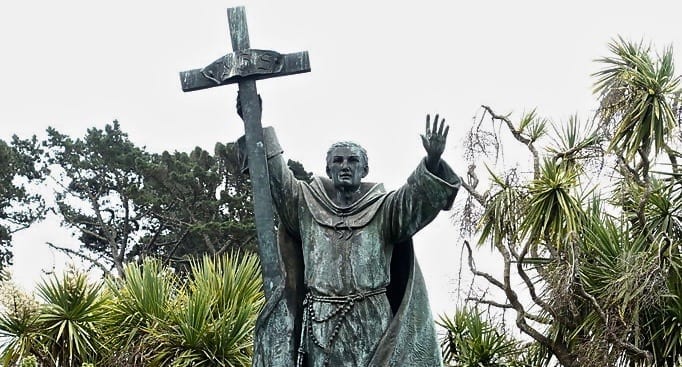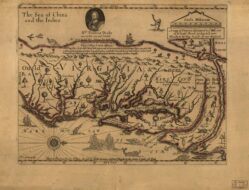
No related resources
Introduction
Mary Dyer (1611–1660) and her husband, William Dyer, were supporters of Anne Hutchinson during her trial for heresy in Boston. When Hutchinson was banished in 1638, the Dyers went with her to establish a new colony in what became Rhode Island. In 1651, the Dyers returned to England to defend their land claims in the new colony; there, they became converts to the recently formed Society of Friends (commonly known as the Quakers).
There were many similarities between Hutchinson’s theology and that of George Fox (1624–1691), the founder of the Quakers. Both groups emphasized the primacy of individual conscience over tradition or the Bible. It is unsurprising, then, that the Dyers found the new sect congenial. Moreover, it seemed only fitting to Dyer that her first trip as an evangelist for the new sect would be to the site of her former disgrace, and so in 1657, she returned to Boston. She was immediately arrested (the colony had passed laws forbidding Quakerism as heretical), and spent most of that year and the next in various prisons. In 1658, the law against Quakers was emended such that the punishment was no longer imprisonment, but banishment upon pain of death, and Dyer was ordered to leave the colony immediately.
After learning that some other Quaker missionaries had been arrested, Dyer returned to Boston, where she too was imprisoned. Sentenced to death, she was released from the gallows after a last-minute reprieve. She returned to the colony again in 1660 and was executed. Edward Burrough, a Quaker apologist in England, published the detailed account of Dyer’s final days excerpted here in order to draw attention to the violent repression of religious freedom by Massachusetts.
Source: Edward Burrough, A Declaration of the Sad and Great Persecution and Martyrdom of the People of God, called Quakers, in New-England, for the Worshipping of God, Paul Royster, ed. (London: 1661), p. 25-31. Electronic Texts in American Studies. 23. http://digitalcommons.unl.edu/etas/23. We have modernized spelling and capitalization.
The Copy of a Letter that Mary Dyer sent to the Rulers of Boston, after she had received the Sentence of Death
To the General Court[1] now in Boston.
Whereas I am by many charged with the guiltiness of my own blood; if you mean in my coming to Boston, I am therein clear, and justified by the Lord, in whose will I came, who will require my blood of you be sure; [you] who have made a Law to take away the lives of the innocent servants of God, if they come among you, who are called by you, “Cursed Quakers”; although I say, and am a living witness for them and the Lord, that He hath blessed them, and sent them unto you: therefore be not found fighters against God, but let my counsel and request be accepted with you, To repeal all such Laws, that the truth and servants of the Lord may have free passage among you, and you kept from shedding innocent blood, which I know there are many among you would not do, if they knew it so to be: Nor can the enemy that stirs you up thus to destroy this holy seed, in any measure countervail the great damage that you will by thus doing procure: Therefore, seeing the Lord hath not hid it from me, it lies upon me, in love to your souls, thus to persuade you: I have no self-ends, the Lord knows, for if my life were freely granted by you, it would not avail me, nor could I expect it of you, so long as I should daily hear or see the sufferings of these people, my dear Brethren, and seed[2] with whom my life is bound up, as I have done these two years; and now it is like to increase, even unto death, for no evil doing, but coming among you: Was ever the like laws heard of among a people that profess Christ come in the flesh? And have such no other weapons but such laws, to fight against spiritual wickedness withal, as you call it? Woe is me for you! Of whom take you counsel? Search with the Light of Christ[3] in you, and it will show you of whom, as it hath done me and many more, who have been disobedient and deceived, as now you are; which Light as you come into, and obeying what is made manifest to you therein, you will not repent, that you were kept from shedding blood, though it were from a woman: It’s not mine own life I seek, (for I choose rather to suffer with the people of God, than to enjoy the pleasures of Egypt) but the life of the seed, which I know the Lord hath blessed;[4] and therefore seeks the enemy thus vehemently the life thereof to destroy, as in all ages he ever did. Oh, hearken not unto him I beseech you, for the seed’s sake, which is one in all, and is dear in the sight of God; which they that touch, touch the apple of his eye, and cannot escape his wrath, whereof I having felt, cannot but persuade all men that I have to do withal, especially you who name the name of Christ, to depart from such iniquity, as shedding blood even of the saints of the Most High. Therefore, let my request have as much acceptance with you (if you be Christians) as Esther had with Ahasuerus,[5] (whose relation is short of that that’s between Christians) and my request is the same that hers was; and he said not, that he had made a law, and it would be dishonorable for him to revoke it, but when he understood that these people were so prized by her, and so nearly concerned her, (as in truth these are to me) as you may see what he did for her; therefore I leave these lines with you, appealing to the faithful and true witness of God, which is One in all consciences, before whom we must all appear; with whom I shall eternally rest, in everlasting joy and peace, whether you will hear or forbear: with Him is my reward, with whom to live is my joy, and to die is my gain, though I had not had your forty-eight hours warning,[6] for the preparation to the death of Mary Dyer.
And know this also, that if through the enmity you shall declare yourselves worse than Ahasuerus, and confirm your law, though it were but by taking away the life of one of us, that That the Lord will overthrow both your law and you, by his righteous judgments and plagues powered justly upon you, who now whilst you are warned thereof, and tenderly sought unto, may avoid the one by removing the other; If you neither hear nor obey the Lord nor his servants, yet will he send more of his servants among you, so that your end shall be frustrated, that think to restrain them, you call cursed Quakers, from coming among you by any thing you can do to them; yea verily, he has a seed here among you, for whom we have suffered all this while, and yet suffer; whom the Lord of the harvest will send forth more laborers to gather (out of the mouths of the devourers of all sorts) into his fold, where he will lead them into fresh pastures, even the paths of righteousness for his name’s sake: Oh! let none of you put this good day far from you, which verily in the Light of the Lord I see approaching, even to many in and about Boston, which is the bitterest and darkest professing place, and so to continue so long as you have done, that ever I heard of; let the time past therefore suffice, for such a profession as brings forth such fruits as these laws are. In love and in the spirit of meekness I again beseech you, for I have no enmity to the persons of any; but you shall know, that God will not be mocked, but what you sow, that shall ye reap from him, that [He] will render to everyone according to the deeds done in the body, whether good or evil; Even so be it, says
Mary Dyer
A Copy of this was given to the General Court after Mary Dyer had received the Sentence of Death, about the 8th or 9th Month, 1659.
A Further Account Concerning Mary Dyers’ Martyrdom
Mary Dyer being freed, as aforesaid, returned to Rhode Island, and afterwards to Long-Island, and there was [for the] most part of the winter, over the Island, where she had good service for the Lord; and then came to Shelter-Island, (when she thought she might pass to Rhode Island) and being there, sometime she had movings from the Lord, to go to Boston, and there she came the 21 of the 3d Month, 1660. And the 30th day was their Governor chosen, and the 31 of the 3d Month, in the former part of the day, she was sent for to the General Court; the Governor said, “Are you the same Mary Dyer that was here before?” (speaking of one in Old-England that returned, and would have made them believe he was not the same man; with more words to that purpose, and said, “Have not you such evasions?”)
Mary Dyer: “I am the same Mary Dyer that was here the last General Court.”
The Governor said, “You will own yourself a Quaker, will you not?”
D. “I own myself to be so reproachfully called.”
The bloody-minded [jailer] having now opportunity to have his blood-thirsty will fulfilled, said, “She is a vagabond.”
The Governor said, “The sentence was passed upon her the last General Court, and now likewise; you must return to the prison from where you came, and there remain until tomorrow at nine of the clock, then from thence you must go to the gallows, and there be hanged till you are dead.”
Mary Dyer said, “This is no more than that you said before.”
“Aye, aye,” the Governor said, “and now it is to be executed; therefore prepare yourself tomorrow at nine of the clock.” (Being the first day of the 4th Month, 1660.)
Mary Dyer answered and said, “I came in obedience to the Will of God the last General Court, desiring you to repeal your unrighteous laws of banishment upon pain of death; and that same is my work now, and earnest request, because you refused before to grant my request, although I told you, that if you refused to repeal them, the Lord will send others of his servants to witness against them.”
John Endicott asked her whether she was a prophet.
She said, “She spoke the words that the Lord spoke in her; and now the thing is come to pass.”
She beginning to speak of her call, J. Endicott said, “Away with her, away with her.”
So she was brought to the Prison-House, where she was before, close shut up, until the next day.
About the time fixed, the Marshal Michaelson came and called hastily for her; when he came into the room, she desired him to stay a little; and speaking mildly to him, she said, she should be ready presently; even like a sheep prepared for the slaughter. But he in the wolfish nature, said, he could not wait upon her, but she should now wait upon him. Margaret Smith, her companion, hearing him speak these words, with others, from the Cain-like Spirit, was moved to testify against their unjust laws and proceedings, being grieved to see both him, and many others, in such gross darkness and hard-heartedness.
Then he said, “You shall have your share of the same,” with other violent words. Then they brought her forth, and drums were beat before and behind her with a band of soul-diers[7] through the town, and so to the place of execution, which is about a mile, the drums beating, that none might hear her speak all the way.
The Words of Mary Dyer Upon the Ladder
Some said unto her, that if she would return, she might come down and save her life (Bonner and Gardiner-like).[8] She answered and said, “Nay, I cannot, for in obedience to the will of the Lord God I came; and in his will I abide faithful to the death.”
Their Captain, John Webb, said she had been here before, and had the sentence of banishment upon pain of death; and had broken this law in coming again now, as well as formerly; and therefore she was guilty of her own blood.
To which M. Dyer said, “No, I came to keep blood-guiltiness from you, desiring you to repeal the unrighteous and unjust law of banishment upon pain of death; made against the innocent servants of the Lord: therefore my blood will be required at your hands, who willfully do it: but for those that do it in the simplicity of their hearts, I do desire the Lord to forgive them. I came to do the will of my Father, and in obedience to his will, I stand even to the death.”
John Wilson, their Priest of Boston said, “M. Dyer, O repent, O repent, and be not so deluded and carried away by the deceit of the devil.”
Dyer answered and said, “No, man, I am not now to repent.”
Some asked her whether she would have the elders to pray for her? She said, “I know never an elder here.”
They asked, whether she would have any of the people to pray for her? She said she desired the prayers of all the people of God. Some scoffingly said, “It may be she thinks there is none here, this is a mock.” M. Dyer looked about and said, “I know but few here.”
Then they spoke to her again, that one of the elders might pray for her. She replied, and said, “No, first a child, then a young man, then a strong man, before an elder of Christ Jesus.”
Some charged her with something that was not understood what it was. But her answer was, “It’s false, it’s false, I never spoke the words.”
Then one said, she should say, she had been in paradise. And she answered, “Yea, I have been in paradise several days.” And more she spoke of her eternal happiness, that’s out of mind. And so sweetly and cheerfully in the Lord she finished her testimony, and died a faithful martyr of Jesus Christ.
And still they are going on in acting their cruel Laws; for the same day, in the former part of it, they sent for Joseph Nicholson, and his wife Jane Nicholson, and banished them on pain of death. Then sent for three more, and whilst they were examining them, there came one to the Court, and told them, “Now M. Dyer is cast off.” Then several of the Court spoke to this purpose, and one scoffingly said, “She did hang as a flag for them to take example by.” [But precious in the sight of the Lord is the death of his saints.] [in original]
But now the fruits of New-England professors are made manifest to the world, who are so far degenerated from the Lord, that they set up the killing of his saints, as an ensign, or a flag, that many may follow their cruelty. These are the people that say, their churches are the purest churches in the world; and that their magistrates, are godly magistrates, and godly ministers: A fair show to the world. . . .
- 1. The General Court was the chief governmental body of the Massachusetts Bay Colony.
- 2. those converted to Quakerism by Dyer and her fellow missionaries
- 3. The Light of Christ, also sometimes referred to as the “Inner Light” in Quakerism, refers to the inward dwelling of the divine within the soul of the believer; see John 8:12 and John 14:15-31 where Jesus speaks of his relationship with his followers as continuing in a direct and personal way even after his crucifixion.
- 4. See John 12:24
- 5. Esther was the wife of Ahasuerus, a Persian King. Ahasuerus did not know that Esther was Jewish. Esther used her favor with the king to save the Jewish people.
- 6. After the first time she was sentenced to death, Dyer’s son petitioned the Court for mercy; she was given a reprieve and ordered to leave the colony within forty-eight hours.
- 7. We have not modernized the spelling of this word, as its use in Massachusetts Bay at the time period was often intentionally meant to convey a sense of the spiritual (soul-diers) obligations incumbent upon Christians to defend themselves and the faith; the editor of this account, Burrough, had been in Massachusetts himself and it is possible he intended this spelling ironically.
- 8. Edmund Bonner (1500–1569) and Stephen Gardiner (1483–1555) were notorious for switching their religious allegiances from Catholic to Protestant and back again, according to the dictates of Court.

Conversation-based seminars for collegial PD, one-day and multi-day seminars, graduate credit seminars (MA degree), online and in-person.
